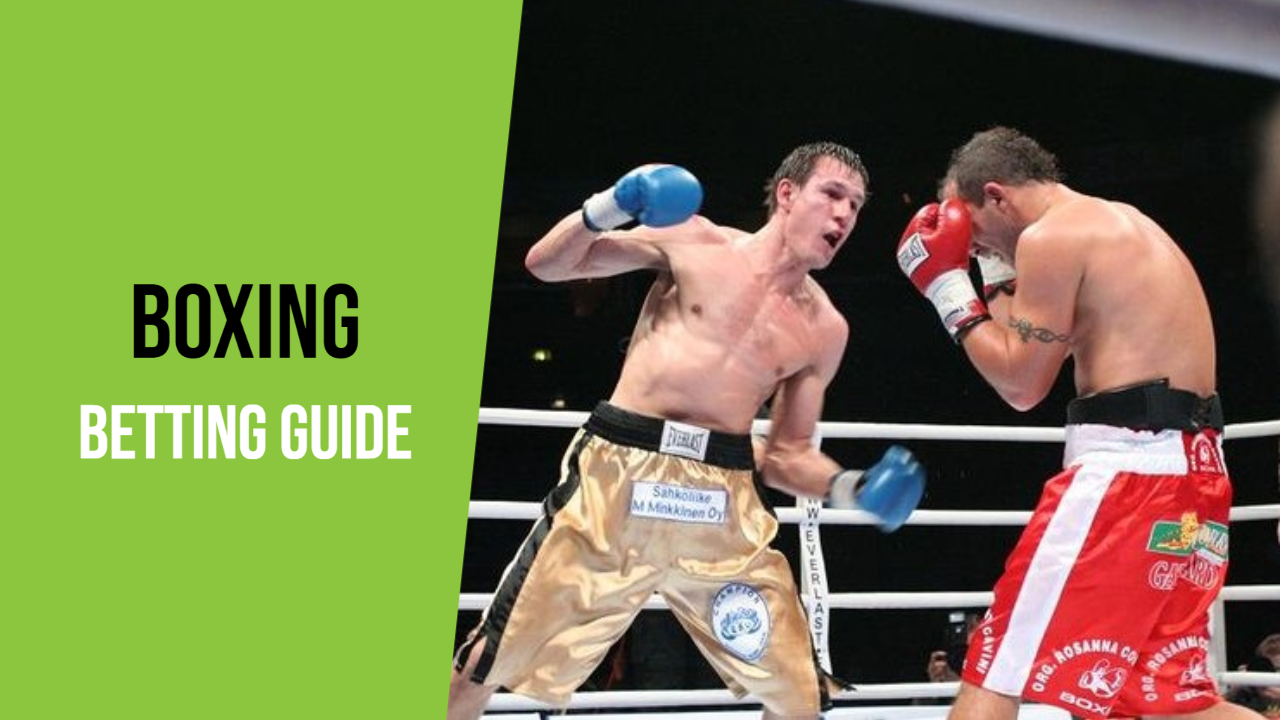
This boxing betting guide provides key insights into the sport and the critical factors that influence fight outcomes. You’ll also discover trusted resources for fighter stats, rankings, and analysis — helping you place more informed boxing bets, whether you’re backing a champion or spotting value in an underdog.
About Boxing Betting
Boxing betting involves placing wagers on the outcome of professional fights, ranging from regional bouts to high-profile world title contests. The most common market is the outright winner, but many bookmakers also offer bets on the method of victory, the total number of rounds, and when the fight will end. Some events even include specials such as the number of knockdowns or punch stats.
Unlike team sports, boxing is a one-on-one contest, making it easier to focus your analysis on the fighters involved. However, understanding styles, physical attributes, stamina, and judging trends is essential to make accurate predictions. One punch can change everything — so while betting on boxing can be unpredictable, it also offers real opportunities for value, especially when the public overestimates hype or reputation.
The sport’s long history and iconic moments — from Muhammad Ali’s Rumble in the Jungle to modern super fights involving Tyson Fury and Canelo Álvarez — have cemented its global appeal. With consistent cards across different countries and a resurgence in cross-promotion events, boxing remains a staple for bettors worldwide.
Why Bet On Boxing?
-
High-Profile Events
Major title fights and pay-per-view bouts attract huge audiences — and often come with competitive betting markets and promotions.
-
Tactical Edge
Boxing is more than brute strength. Styles, stamina, reach, and strategy all play a role — giving informed bettors an edge over casual punters.
-
One-on-One Focus
With only two competitors and fewer variables than team sports, boxing allows for focused analysis of individual fighters.
-
Momentum Swings
One punch can change everything — which makes live betting on boxing especially popular during closely matched bouts.
Popular Boxing Competitions
Most world title fights are sanctioned by one of four main governing bodies. These organisations rank fighters, set mandatory challengers, and crown champions across multiple weight divisions:
- WBA (World Boxing Association): The oldest major sanctioning body, founded in 1921. The WBA has a long history but is often criticised for having multiple champions in a single division.
- WBC (World Boxing Council): Founded in 1963 and widely seen as the most prestigious. The WBC belt is highly regarded, and the organisation is known for its strict medical standards and title policies.
- IBF (International Boxing Federation): Established in 1983, the IBF is known for its transparency and enforcement of mandatory challengers, which tends to produce more competitive matchups.
- WBO (World Boxing Organization): Formed in 1988 and now a fully recognised major body. The WBO has hosted many high-profile bouts and is respected for its clearer ranking system.
Major events like UFC crossover bouts, Matchroom and Top Rank PPVs, and Saudi-hosted super fights have become key fixtures in the boxing calendar. While not always tied to a specific organisation, these cards attract global attention and dominate betting markets — especially when belts are unified or lineal titles are at stake.
Best Bookmakers for Boxing Betting
I recommend the following bookmakers for placing boxing bets:
#ad ● 18+ ● Play Safe ● GambleAware.org
#ad ● 18+ ● Play Safe ● GambleAware.org
#ad ● 18+ ● Play Safe ● GambleAware.org
#ad ● 18+ ● Play Safe ● GambleAware.org
#ad ● 18+ ● Play Safe ● GambleAware.org
#ad ● 18+ ● Play Safe ● GambleAware.org
New UK customers. Min £10 first deposit. Place a bet of £10 at min odds of 2.0 and get £40 in Free Bets within 48 hours. Restrictions apply. Full T&Cs apply, 18+. BeGambleAware.org
#ad ● 18+ ● Play Safe ● GambleAware.org
#ad ● 18+ ● Play Safe ● GambleAware.org
#ad ● 18+ ● Play Safe ● GambleAware.org
#ad ● 18+ ● Play Safe ● GambleAware.org
Considerations for Boxing Betting
To make smart boxing bets, you need to understand more than just form and reputation. Style matchups, physical traits, and mental resilience all influence outcomes — especially in close contests or unpredictable fights. Here are the key factors to assess before placing a wager:
Physical Attributes
Body type and natural traits can affect fight dynamics and which markets offer value:
- Height and reach: Taller fighters can control distance with the jab. Shorter opponents often need to close the gap and fight inside.
- Weight: Cutting too much weight may reduce stamina. Moving up a division can increase durability but lessen power.
- Punching power: Heavy-handed fighters are more likely to score knockouts — key for early-round or KO markets.
- Hand speed: Fast fighters land more clean shots, especially in technical bouts likely to go the distance.
Technical Ability
Clean technique separates elite boxers from brawlers — and often determines success over the distance:
- Footwork: Helps control range, avoid danger, and score with counters — often a deciding factor on the cards.
- Punch accuracy: Fighters who consistently land clean shots tend to win rounds even without overwhelming power.
- Defence: Good head movement, blocks, and parries reduce damage taken — boosting the chances of surviving to the final bell.
- Combinations: Volume punchers who string shots together can outwork opponents and steal rounds with activity.
Conditioning & Durability
Fitness and toughness play a key role in how a fighter performs — especially in longer fights or high-tempo bouts:
- Endurance: Poor stamina leads to reduced output and higher risk of late stoppage. A well-conditioned fighter is dangerous in all 12 rounds.
- Durability: Fighters with a proven chin are less likely to be stopped — a strong indicator for distance or over-rounds markets.
- Recovery between rounds: Some fighters look gassed mid-round but recover well with 60 seconds of rest — helpful in live betting.
- Injury or cut risk: Fighters with a history of cuts or fragile skin may be vulnerable to stoppages even when winning.
Mental Strength & Motivation
Boxing is as much mental as it is physical. Mindset often influences how a fighter responds to setbacks:
- Confidence: A mentally strong fighter sticks to their game plan and takes calculated risks when needed.
- Resilience: Can they bounce back after getting rocked or losing a round? Valuable when betting live or in long-distance bouts.
- Focus under pressure: In hostile venues or big events, some fighters thrive — others freeze or make costly errors.
- Motivation: Fighters chasing a title or home advantage often perform better than those coasting or cashing out their career.
Experience & Activity
Experience brings ring IQ — but inactivity and age can undermine even the most seasoned boxer:
- Ring awareness: Veterans know how to steal rounds, avoid danger, and manage pace — useful in decision-based markets.
- Decline with age: Older fighters may show reduced stamina, slower reflexes, or struggle against high-pressure opponents.
- Inactivity: Boxers returning from long layoffs often display rust — poor timing, low volume, or early fatigue.
- Wear and tear: Fighters with wars behind them may carry hidden damage — making them less durable than expected.
Strategy & Adaptability
Good fighters execute a plan. Great fighters adjust mid-fight — and that can be decisive in 50/50 matchups:
- Style matchup: Pressure vs counter-puncher? Southpaw vs orthodox? How styles interact often determines who controls the pace.
- Game plan execution: Did the fighter prepare to exploit a specific weakness — or are they hoping to wing it?
- In-fight adjustments: Fighters who adapt to early trouble tend to win more often — ideal for late-round or live bets.
- Discipline: Even strong game plans fail if a fighter gets reckless, overconfident, or ignores instructions.
Judging & Decision Risk
Boxing scoring is subjective — and it pays to anticipate how the judges might see a close fight:
- Scoring criteria: Judges award rounds based on clean punching, effective aggression, defence, and ring generalship.
- Local bias: Home fighters often get the benefit of the doubt in close rounds, especially on regional cards.
- Style preference: Some judges favour volume and aggression; others lean toward accuracy and counterpunching.
- Promoter influence: Fights promoted by one fighter’s camp can subtly affect how close decisions go — even unintentionally.
For distance fights with no clear edge, consider markets like split decision or underdog by decision. In contrast, wide favourites in technical matchups may justify points victory bets — but only if the judging risk is low.
Boxing Betting Markets
Boxing offers a range of betting markets, from straightforward outcomes to more specific props. Understanding how and when to use each market can help you find better value and tailor your strategy to the matchup.
- Winner (Outright): A straight bet on which fighter will win the bout. It’s the most common market, but may offer limited value on heavy favourites unless used in accumulators or combined with method bets.
- Method of Victory: Wager on how the fight will be won — by knockout (KO/TKO), decision (unanimous, majority or split), or disqualification. This market suits punters who have a strong read on a fighter’s style, power, and opponent’s durability.
- Round Betting: Predict the exact round in which the fight will end. High-risk but high-reward, this market is best used when you expect a one-sided fight or a late finish from a known closer.
- Group Round Betting: A safer variation of round betting — choose a cluster of rounds (e.g. Rounds 7–9) rather than just one. This gives more margin for error while still offering decent odds.
- Total Rounds (Over/Under): Bet on whether the fight will go over or under a set number of rounds (e.g. Over 8.5 rounds). Ideal for assessing cardio, durability, and the likelihood of a decision.
- Fight to Go the Distance: Bet on whether all scheduled rounds will be completed, regardless of the winner. This market is useful when both fighters are durable or more technically inclined than aggressive.
- Specials (Props): Bookmakers may offer custom bets such as number of knockdowns, whether a fighter will be knocked down and win, or time of stoppage. These are best used in high-profile bouts with plenty of data and media coverage.
Markets can vary between bookmakers, especially for smaller fights — so it’s worth shopping around for odds and options. Always consider how a fighter’s style, recent form, and matchup history point toward a specific type of result.
Best Sites for Boxing Stats
The following websites offer free statistics, records, and fighter profiles to support your boxing analysis:
To learn more about how these platforms compare, check out: Best Sites for Free Boxing Statistics.
Boxing FAQ
Boxing is a combat sport in which two competitors fight using only their fists, aiming to outscore or stop each other over a scheduled number of rounds. Professional boxing is regulated by sanctioning bodies and governed by weight classes, medical rules, and scoring criteria.
Most professional bouts use the 10-point must system. The winner of each round receives 10 points, and the opponent typically receives 9 or fewer. Judges score based on clean punches landed, effective aggression, ring generalship, and defence. If no knockout occurs, the winner is determined by the judges’ scorecards.
Boxing has multiple weight divisions to ensure fair competition. Common professional classes include:
- Flyweight (112 lbs)
- Bantamweight (118)
- Featherweight (126)
- Lightweight (135)
- Welterweight (147)
- Middleweight (160)
- Light Heavyweight (175)
- Cruiserweight (200), and
- Heavyweight (200+)
Each sanctioning body may use slightly different naming conventions and limits for lower divisions.
A KO (knockout) happens when a fighter is knocked down and fails to beat the referee’s 10-count. A TKO is a stoppage without a full knockdown — usually due to accumulation of damage or a corner retirement.
Most non-title fights are scheduled for 4, 6, 8, or 10 rounds. Championship fights and major bouts are typically 12 rounds, each lasting 3 minutes, with 1-minute intervals between rounds.
Yes. If the judges’ scorecards are even — or if a fighter cannot continue due to an accidental foul before enough rounds have been completed — the result can be a draw or a “no contest.” This can impact bet outcomes, particularly in decision and round markets.
Judging is subjective, and controversial decisions are common — especially in close fights or when scoring styles differ. Bettors should always consider location, judging history, and fighter popularity when assessing risk in decision markets.
- Betplay.io Review| Secure Crypto Betting Site & Casino Platform [2026] - February 16, 2026
- Bookmakers With The Highest Odds | Bookies With Best Prices - February 16, 2026
- Flat vs. Percentage vs. Kelly: Which Staking Plan Fits Your Style? - February 15, 2026










